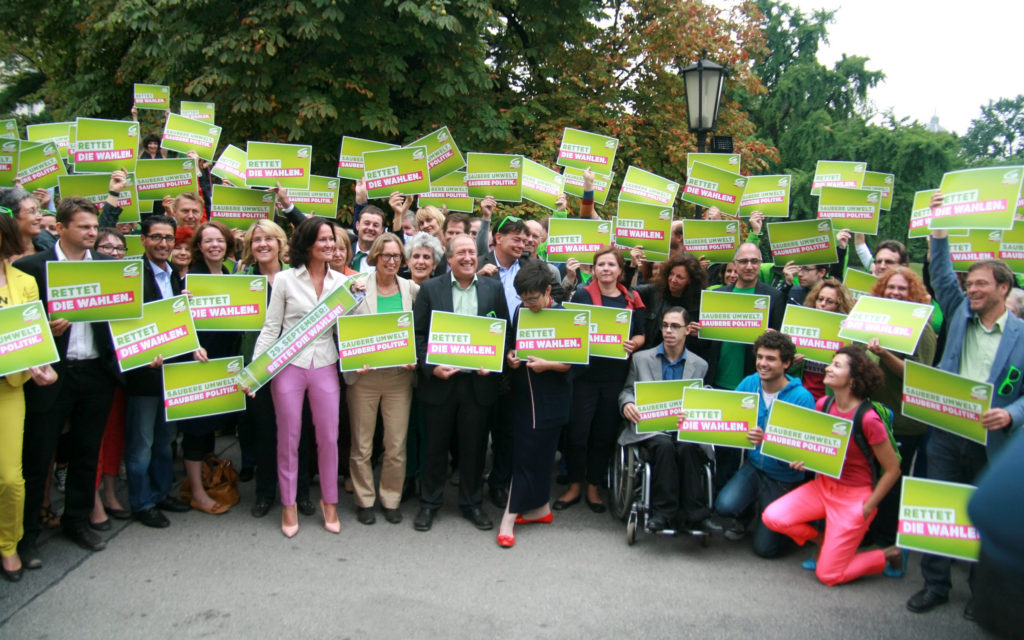Green “Debacle” as Austrian Right Returns
The Austrian Greens have lost all 24 seats in parliament following Sunday’s election after being squeezed by big personalities across the political spectrum.
On Thursday the Greens’ worst result since 1983 was confirmed after the count of postal ballots finished. Their vote share fell by two thirds from 2013 despite former leader Alexander Van der Bellen’s victory in the presidential election last year.
The Greens missed the 4% vote share threshold needed to enter parliament (the full count is available here). The collapse in vote share and total loss of seats is a disaster for the party that top candidate Ulrike Lunacek called a “debacle”.

The poll was led by the centre-right Austrian People’s Party under 31 year-old Foreign Minister Sebastian Kurz who is set to become Europe’s youngest national leader. His likely coalition partners are the far-right Freedom Party, narrowly lost out in a close race to determine second and third place with the Social Democratic Party, leaders of the current governing grand coalition.
The election result is being read by many as another triumph of the populist right which has seen far-right parties performing strongly in The Netherlands, France and Germany this year. However, especially when the Green result is considered in the context of the wider election, personality politics must also be considered a factor.
Certainly migration and refugees made a difference to the results. Austria accepted a comparatively high number of refugees during the 2015 crisis when compared to other European counties which was unpopular with many voters and migration was the most common response from voters when asked which issues mattered most to them in this election. Kurz’s triumph is being put down to his aping of the Freedom Party’s virulently anti-migrant, anti-refugee politics. He is credited by many Austrians for reducing the numbers of refugees traveling along the Balkan route to Austria. Yet his personalisation of this issue and the election as a whole should also be thought of as a separate factor.
Kurz has simultaneously remodelled the People’s Party in his own image whilst adopting much of the rhetoric of the Freedom Party. He changed the party’s colour from a traditional Christian Democratic black to turquoise, and campaigns under brands such a “Sebastian Kurz List” and “The New People’s Party”.
Kurz is more popular than his party, and the politics of his personality were at the centre of his campaign. Austrian voters were made amenable to such a personality driven politics by migration issues, which destroyed the trust of many in the political class. Kurz seized on this.
Historically Austria has not been shy about electing the far-right, the Freedom Party was in government from 1999 to 2006 as a junior coalition partner to the People’s Party, so we should not overestimate the political shift that has transpired. This is a shift to the right, but not unprecedented and not necessarily a straightforward result of a recent refugee crisis. That history should also taper some of the breathless commentary around Kurz. His personality cult will have pulled off quite a feat should he secure his coalition with the Freedom Party, but it is a feat that has been done before.
Personality also played a big role in the Greens’ disaster. Again migration issues provided the background. The Greens took strong pro-migrant and refugee positions in response to the migrant crisis but there was disappointment amongst some in the party that the response was insufficient to the scale of the issue. One despondent leader within the party, Peter Pilz, left the party in July and ran under his own “Peter Pilz’s List” banner in the election. His list looks to have secured just enough of the vote to gain seats in parliament. This split played a large role in syphoning away Green support towards Pilz’s personal election vehicle.
The split doesn’t appear to have been entirely about migration policy however, as internal personality clashes and disputes about Pilz’s personal ranking on the party list (which is important in determining which Green candidates will gain seats in parliament) also appear to be a factor in his defection.
A similar process seems to have taken place regarding Green voters who switched to the Social Democratic Party. Though the incumbent Chancellor, Christian Kern only took office last year after being drafted in from the state railway company. He is viewed as a charismatic figure from outside of politics and it is at least partly due to him that many Green voters appear to have switched to the Social Democrats. These switchers, especially in cities such as Vienna and Graz, are a likely reason the Social Democrats have more or less maintained their vote share from 2013 despite losses elsewhere.
Big personalities like Kurz, Kern and Pilz have squeezed the Greens in this election. The shock of missing out on parliamentary seats entirely may provide the impetus for a major rethink that is surely sorely needed.

Gutment!